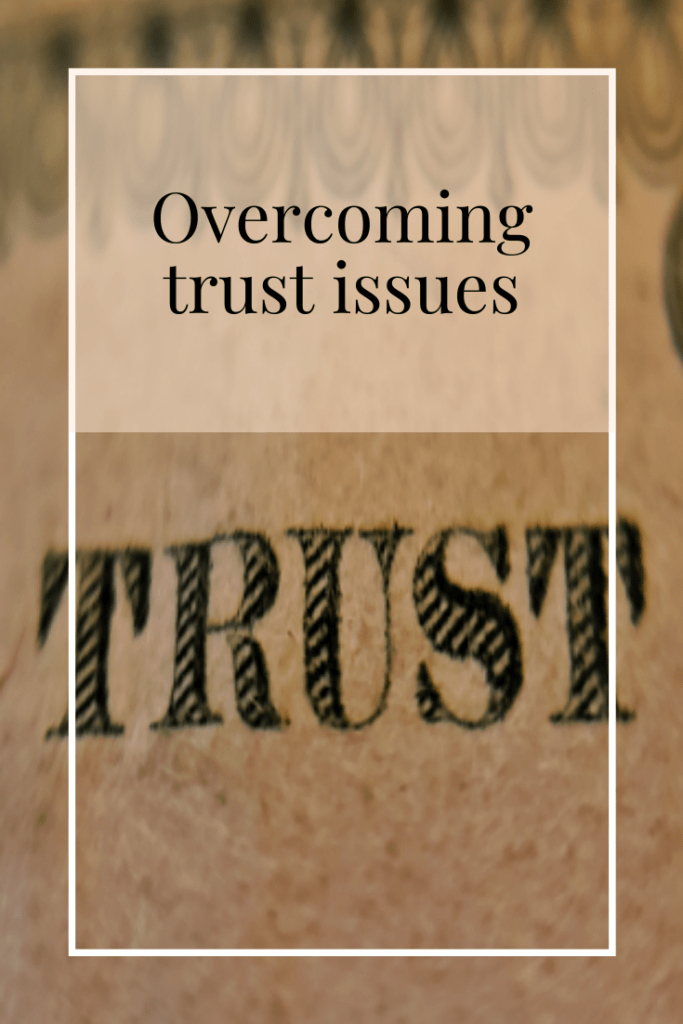I have trust issues. Mine started in childhood. I find it difficult to be vulnerable, and to ask for help. Unfortunately, disruption and uncertainty throughout my life have certainly played their part. Covid-19 has been a factor for many in the breakdown of trust, for others it has strengthened trust in others and themselves.
Trust is at the core of any relationship. When everyday life causes stress starts to disturb us, we can begin to feel insecure and our lack of confidence creeps in and we start to doubt ourselves. As a result, we can turn this onto others, for instance begin to question our partner’s love, and trustworthiness, and we unconsciously start to pull away from them, making the divide even greater, and causing them to do the same.
The dictionary defines trust as the act of placing confidence in someone or something else. Having a firm belief in the reliability, truth, ability, or strength of someone or something. Those who have integrity, and whose actions align to their words and who is consistent. In an intimate relationship, we trust our partner if they are predictable, reliable, and honest. Trust for ourselves involves being able to do something without fear or misgiving, having confidence within ourselves.
Without trust, we have fear. We need trust to be happy. It’s a matter of perception and degree. It is built on life experiences, and destroyed in the very same way. Trust is about believing that other people will behave as you expect, and the expectations that we put on others, especially without voicing them, can be traumatic when you then feel let down, rejected, or alone.
What are trust issues?
Trust issues can also be explained as a defence mechanism. A classic one is self-sabotage. By projecting what has happened in the past onto what might happen in the future, you are trying to create ways to avoid being hurt, disappointed, let down, which usually only leads to self-fulfilling prophecy. Anxiety, fear of rejection, abandonment, all play a part in destroying trust.
Three signs you may have trust issues:
- You find it difficult to believe what other’s tell you. Trust can’t flourish without honesty. If someone currently in your life has lied to you, or if you’re projecting from the past, fact-finding, questions after questions, needing to confirm what they said is a clue that you are struggling to trust.
- You’re a pessimist. You’re always waiting for the other shoe to drop, even with no evidence that it might, or being suspicious of another’s motives or behaviours.
- Keeping others at arm’s length. With a lack of trust comes difficulties with being vulnerable and finding yourself being withdrawn. A very dear friend of mine once said I’m a very difficult person to get to know. It’s true. And yes, it takes a while, sometimes a long while, for me to move past a superficial level of friendship and really open up. Whilst still not easy, and some people I do keep at arm’s length because they’ve not yet given me reason to do otherwise, years of working on healing my past has been a great help.
Where do trust issues come from?
Just as patterns in life build our ability to trust, they also destroy it. Trust issues can arise from:
- illness such as mental health, PTSD
- home or car broken into
- loss of loved one
- infidelity/being left for another, which expands to more than the two in a relationship. If there was infidelity in your parents relationship, this will affect you too.
- an accident. I had a pretty nasty car accident a few years ago and for a while I was a very nervous passenger.
- assault, physically, verbally, and/or emotionally
How to improve trust
- Honesty and integrity. Remember, it’s about actions, not words. It doesn’t matter what you or they are saying if you don’t back it up with your actions. Take time to get to know yourself, including the parts you might not like, and you will build trust in yourself, your values, your thoughts and feelings. You’ll learn to trust your intuition and start to pick up the difference on the good and the bad. If you live with integrity, this will in turn help others to trust you too.
- Learn from the past and make peace with it. Approach it as you would the grieving process. Choose to give yourself permission to work through it. Acknowledge it happened. Get angry. Bargain to undo it. Be sad. Then, when you’re ready, accept it, and move on. Many of us can get stuck between angry and sad. If you don’t accept it and move on, you’ll repeat the patterns through future relationships. That was then, this is now.
- Baby steps. Don’t rush. Trust isn’t built overnight. As with honesty and integrity, it takes time for others to see it, and for you to see it in them. Let them earn it! Learn their values, their views, ie do you have the same views on monogamy, family, how the home should be run. Don’t ignore what they tell you.
- Trust Yourself. You left poor situations? Celebrate that. Celebrate that you knew it wasn’t right. And as things pop up, face them and talk it through with someone safe.
Trust is important. It helps to maintain love, affection, and intimacy in all relationships, especially the one with yourself, and help you have a safe place to land when you need it.
Want to hear more? I’d love for you to sign up to my newsletter of weekly inspiration, mindset hacks, and content created with YOU in mind. I promise I won’t spam you, and you can unsubscribe at any time.

